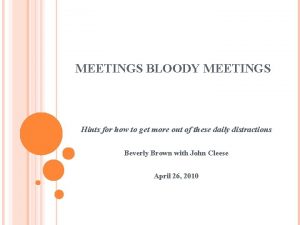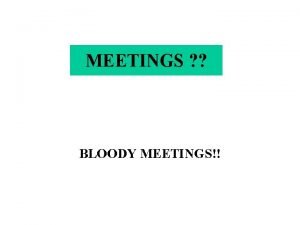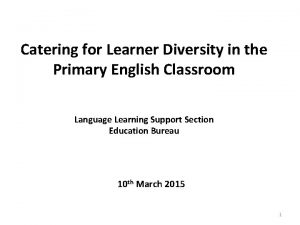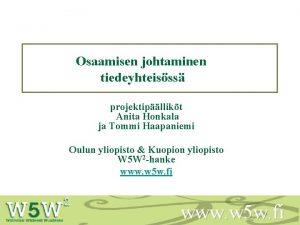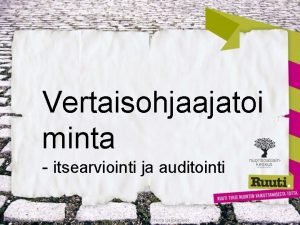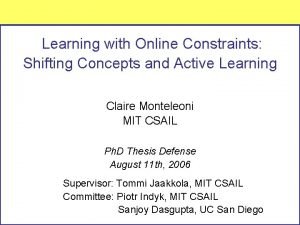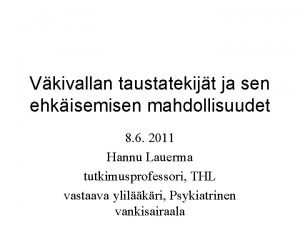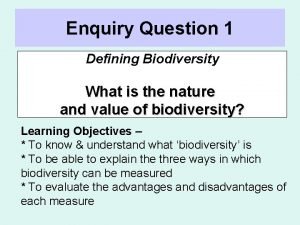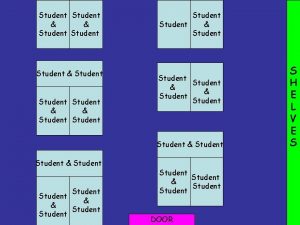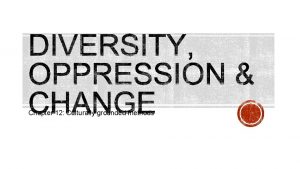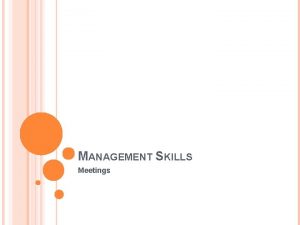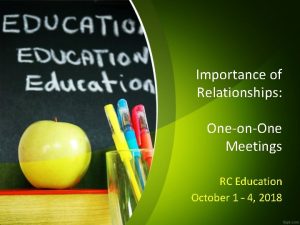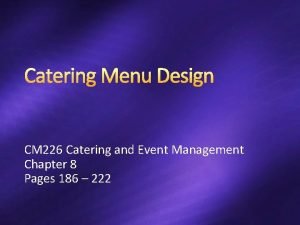CATERING TO STUDENT DIVERSITY WITH ONEONONE MEETINGS Tommi











- Slides: 11


CATERING TO STUDENT DIVERSITY WITH ONE-ON-ONE MEETINGS Tommi Tikka Language Specialist National Defence University Language Center

INTRODUCTION 1. 2. 3. 4. 5. Challenges circa 2010 Solution: One-on-one meetings Mixed feedback Advantages & disadvantages Ideal future National Defence University Language Specialist Tommi Tikka BILC 2014, Ellwangen

CHALLENGES CIRCA 2010 TWO BIG CHALLENGES: 1. Nearly as many skill levels as students (CEFR A 1 – B 2) 2. Acute shortage of classrooms National Defence University Language Specialist Tommi Tikka BILC 2014, Ellwangen

SOLUTION: ONE-ON-ONE MEETINGS 1. Info session where students were divided into four groups 2. Each group was assigned a tutor 3. Each student was ordered to take the Dialang test as well as the in-house proficiency test and report their respective scores to their tutor 4. Each student was expected to set up one-on-one meetings with their tutor – the number of meetings depended on their skill-level National Defence University Language Specialist Tommi Tikka BILC 2014, Ellwangen

MIXED FEEDBACK • CADETS – 3/5 • MASTER’S STUDENTS – 3. 5/5 • SENIOR STAFF OFFICER STUDENTS – 4/5 National Defence University Language Specialist Tommi Tikka BILC 2014, Ellwangen

ADVANTAGES AND DISADVANTAGES • Advantages: – getting to know the learner (needs analysis) – tailor-made materials and syllabus catered for student diversity (negotiated learning seasoned with non-negotiables) – each participating student is given an opportunity/forced to do the work (motivation. . . through purpose and incentive. . . rarely fear) – time for detailed feedback (learning takes place in cycles) – drastic improvement in the quality of students’ work • Disadvantages: – huge workload for the teacher – in a world of strict weekly schedules and boarding-school mentality, students fall behind quickly – inactive students, change is slow, the system is build to push each student through, regardless of their skill level National Defence University Language Specialist Tommi Tikka BILC 2014, Ellwangen

IDEAL FUTURE • One-on-one meetings with master’s students and senior-staffofficer students • Hybrid version for cadets – small group meetings (2 – 3 persons) for first-year and second-year cadets as well as one or two classroom sessions – one-on-one meetings for third-year cadets Additionally…we should give the students a new incentive! • From YKI (National Certificate of Language Proficiency) to STANAG test (level 2) • STANAG test (level 2) as the big test at the end of the cadets’ language studies, retake during the master’s phase • STANAG test (level 3) for the master’s students wishing to write their thesis in English National Defence University Language Specialist Tommi Tikka BILC 2014, Ellwangen

CONCLUSION 1. Original challenges solved with one-on-one meetings 2. New challenge: a system that defies weekly schedules and demands initiative 3. Student feedback correlates with years in service 4. More advantages than disadvantages 5. Future = one-on-one meetings (hybrid version for cadets) + STANAG 2 National Defence University Language Specialist Tommi Tikka BILC 2014, Ellwangen

TWO COMPELLING BOOKS TO READ. . . Bain, Ken. What Best College Teachers Do. Cambridge MA. Harvard University Press, 2004. Bottom line ”it’s not so much what teachers do; it’s what they understand. ” Willingham, D. T. Why don't students like school? : A cognitive scientist answers questions about how the mind works and what it means for the classroom. San Francisco, CA: Jossey-Bass, 2010. Bottom line ”first learn how the human mind works, then teach. ” National Defence University Language Specialist Tommi Tikka BILC 2014, Ellwangen

Thank you National Defence University Language Specialist Tommi Tikka BILC 2014, Ellwangen
